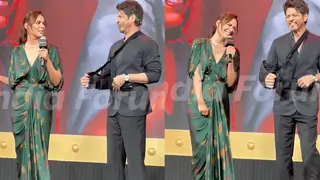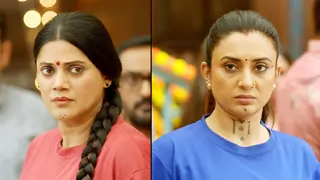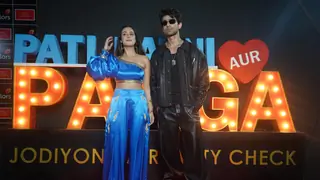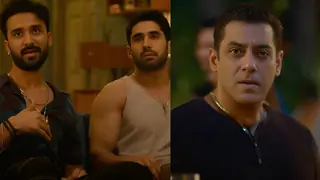Remembering Hemanta-da
Salil Chowdhury's tribute to Hemanta Mukherjee
I came to know of Hemanta Mukherjee in the mid 40's. We did have a few casual encounters, but I had never had the oppurtunity to know him closely. I had met Hemanta Mukherjee for the first time at George-da(Debabrata Biswas)'s house. We exchanged common courtesies and that was just about it. Then came 1948. The Communist Party of India(CPI) was declared illegal. I should mention here, that I had actively involved myself with the workings of CPI from 1946. Most of my days were spent underground. In Calcutta, 'Jashoda Bhavan', located near Golpark, was our frequented hideout and a hub for political meetings. In one such meeting, Krishno Bandyopadhyay, a pupil of Bhismadev Chattopadhyay, and a member of our discussion group, suggested to get Hemanta Mukherjee to sing my songs.
Meanwhile Hemanta Mukherjee and Suchitra Mitra had started singing for the IPTA. Under Binay Roy's leadership and Georga-da's influence they had involved themselves with the people's movement.
So one day, some time around 1948-49, I visited Hemanta Mukherjee's residence at Indra Roy Raod in South Calcutta. I met him, got acquainted with him and soon he became my Hemanta-da. By that time a few of my songs written for the IPTA had become popular. I sang some of them to Hemanta-da and he greatly appreciated them. But he was apprehensive, "These songs cannot be recorded in these times.
If you have any other songs I might sing them." I did not have any other songs ready at that moment. So we decided to meet some other time, think about new themes for songs, etc. As I came halfway down the stairs, I suddenly remembered a new song that I had just begun composing. I mentioned it to him and he instantly called me back. He heard half the song and was ecstatic. "This is the appropriate song to be recorded, complete it and I will record it." And thus was born 'Kono ek gayer bodhu'. I returned home, wrote the second part of the song and set the tune. Within a couple of days I returned to Hemanta-da with the complete song and he picked it up immediately. That very night 'Yashoda Bhavan' was raided and I had to flee to Sandeshkhali. Once again I had to go underground.
That year, August 1949 I believe, I heard that Hemanta-da had recorded 'Gayer bodhu' as a Puja number. And surprisingly, he himself had arranged the orchestration. The song became a smash hit as soon as it was released. What we call super-duper hit nowadays - maybe more than that.
How old was I then? Hardly twenty or twenty-one. My short build made me look younger. Nobody believed that I had written and composed the music for Hemanta-da's super-hit song. I remember an amusing incident from that time.
Hemanta-da, Suchitra Mitra and myself were touring Gauhati with the IPTA troupe. At one function, the principal of Cotton College refused to believe that I was Salil Chowdhury - the composer of Hemanta Mukherjee's path-breaking song. Hemanta-da had come forward that day and saved me from an embarassing situation.
Hemanta-da had also arranged the orchestration for 'Runner'. When I had sang the song to Hemanta-da, I had just given him a few hints about the orchestration. The rest was all his creation. It was the same story again - I was underground, the song got recorded and released in my absence, and once again we had a super hit. Hemanta-da recorded two more songs composed by me that year(1950), 'Abak Prithibi' and 'Bidraha aaj'. Earlier George-da and Priti Sarkar used to sing these songs. George-da sung them to Hemanta-da one day and said "Hemanta, why don't you record these songs? They (Gramophone Co.) won't allow me to sing them." Hemanta-da picked up the songs that very day.
Between 1950 and 1952 my contact with Hemanta-da got strained. He had left for Bombay. I was working on Satyendranath Dutta's 'Palkir gaan' at that time. It took more than three months to compose. Right at that time, my father expired.
On hearing about my loss, Hemanta-da not only paid his condolences, he even offered me a job as his assisstant music director in Bombay. But by then I had got busy with music direction in Bengali films and had to decline his offer.
My film music was gaining popularity in Bengal. Amidst his busy schedule, Hemanta-da flew to Calcutta one day and sought me out. 'Palkir gaan' was ready by then. Hemanta-da was very happy when he heard the song. Here I should mention a quality of Hemanta-da which set him apart from the rest - to accept and recognize new trends. Few people possess this ability. I mean, he had the courage to accept a novel endeavour as a challenge. He was overjoyed to hear 'Palkir gaan' - a new experiment, a risk only he could dare to partake. Palkir gaan was recorded in 1952. It opened a new vista in Bengali modern songs.
The following year I set off for Bombay in response to Bimal Roy's request for making a film, based on my story "Do Bigha Zameen". I was also the MD for the movie. The songs for this film were sung by Manna De, Rafi and Lata Mangeshkar. These songs did not exactly suit Hemanta-da's voice, which he also understood and there were no hard feelings. In my very next movie, Bimal Roy's 'Biraj Bahu', Hemanta-da sang all the four songs for the hero. Then both of us got busy in our own spheres of work. But whenever we met, Hemanta-da would hasten "Salil, compose a song for the Pujas". A couple of years after that Hemanta-da once again recorded two of my songs - "Pathe ebar naamo sathi" and "Dhitang Dhitang bole". Our combination for Bengali Puja numbers continued unparalled for a number of years.
But our alchemy instigated a group of people to cause a rift between us. And they were successful. They went to Hemanta-da and complained "Salil Chowdhury is saying - 'Hemanta Mukherjee would not have been popular if he had not sung my songs'". And the very same people came to me saying "Hemanta-da says - 'If I had not sung Salil's songs who would have know him today?' This created a misunderstanding between us. Hemanta-da refrained from singing my songs for a few years. Lata recorded some of my Bengali songs and they gained popularity. Hemanta-da became very touchy on this. So one day I directly spoke to him "Hemanta-da, I heard that you commented 'Who is Salil Chowdhury without me?'. Hemanta-da was furious. "What are you saying? On the contrary, I heard that it was you who said 'Who is Hemanta...'" Immediately the truth dawned on us. Misunderstandings and prejudices sorted, Hemanta-da recorded two new songs 'Amay proshno kare' and 'Shono kono ek din'. After the recording session Hemanta-da remarked, "Salil, you have given words to expressions of my heart." Hemanta-da continued recording with me after that.
Back in Bombay, following the success of 'Madhumati' I had become overly busy. I could not devote enough time to Bengali music. Around that time I also got involved with the 'Bombay Youth Choir'. Although Hemanta-da and I remained close, our musical connection almost got severed. Then, about eight years back Hemanta-da re-recorded ten of our old hits on LP. I was busy in Bombay and Samir Seal did the orchesration for some of the songs. I was not upset, but I felt bad about it. The entire project had been executed in my absence. Anyway, when I came across Hemanta-da he reasoned "Salil, you must have heard I have re-recorded your songs. Do you know something? All along I had been singing your songs without understanding their meaning. Now with age I find a new meaning in them. But my voice may betray me, so I decided to record them at the first oppurtunity. I am sure you will not mind.". I might mention here that the re-recorded songs were a bit less lustrous than the original versions. The orchestrations had also been altered in some cases. A few years before this incident Hemanta-da had recorded 'Thikana' in Bombay. The year was 1970. Soon after that Hemanta-da settled in Calcutta. I remained in Bombay. In the meantime we had worked together in the Bengali movie "Rai Bahadur" (1964)- his songs were superb. Time passed, we did not work together for a long time. Then in 1980 we again got together on an LP 'Anek gaaner pakhi', featuring six of my compositions.
Personally I feel that this was an outstanding album. Unfortunately, Hemanta-da fell ill right before the recording. Consequently, the songs weren't very popular. But just three months back, we again teamed up for a song for the Bengali movie "Haraner nat-jamai". The song goes "O aay re, o aay re". In fact this is my old composition - 'Dhan katar gaan'. Hemanta-da was sick, his voice was failing. But we still went ahead with the recording - dubbing on the track-recording. The song took six recording sessions to complete. This song is one of my treasured possessions now.
Today I feel very happy to say that there was not a single interview where Hemanta-da had not praised me exuberantly. This was a great source of encouragement for me. Recently Hemanta-da used to tell my friends,"What's Salil upto nowadays? Recording studios are not meant for him. (Hemanta Mukherjee was referring to the recording studio started by Salil Chowdhury). Business does not suit him. Tell him to concentrate on his real work." These were Hemanta-da's last words for me - not only an advice from an elder brother but a divine blessing.
(another translated article from a bengali mag. 1989)





























